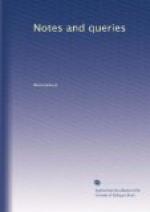AN EAST ANGLIAN.
Hockey, a game played by boys with a stick bent at the end, is very likely derived from hook, an Anglo-Saxon word too. But we cannot suppose that anything else was derived from that, and especially when we come to words apparently more genuine than that. It seems natural to connect them with a hock-tide, Hoch-zeit (German), and Heoh-tid (A.-S.), a name given to more than one season when it was usual to have games and festivities. Now surely this is nothing else than high tide, a time of some high feast; as we vulgarly say, “high days and holidays.” So in the Scripture, “that Sabbath day was a high day.” So high Mass. We Protestants have no conception of the close connection between the superior sanctity and the superior jollity of a particular season. Among the heathen Romans, festicus is derived from festus.[3] We say high romps, high jinks.
See Wachter, who applies Hoch-zeit to Christmas, Easter, and Whitsuntide, and says it may be derived either from high, or from Hogen, “gaudere,” which also see. He says that the lower Saxons “hodie utuntur ‘Hoege’” to mean “gaudium privatum et publicum convivale et nuptiale.” See also Hohen. See Lye, who has also heah, freols summa festivitas, summum festum.
Ihre (Lex. Suio Goth.) says Hugna is “to make glad.” But in Hog-tid he observes, that gladness is only the secondary meaning of Hogen,—“Hokanat vocabatur a Borealibus festum quod media hieme celebrabatur;” and he shows that hawks were formerly sacrificed at it.
C.B.
[Footnote 3: Is not the
derivation of “feast” and “fast”
originally the
same? that which is appointed,
connected with “fas,” and that from
“fari.”]
Howkey or Horkey (No. 17. p. 263.).—Is not this word simply a corruption of Hockey? Vide under “Hock-cart,” in Brand’s Antiquities by Ellis, where the following quotation from Poor Robin’s Almanack for 1676 occurs:—
“Hoacky is brought home with
hallowing,
Boys with plum-cake the cart following.”
J.M.B.
Luther’s Portrait at Warwick Castle (No. 25. p. 400.).—The Portrait by Holbein, in Warwick Castle, certainly erroneously stated to be that of Luther, was, I believe, engraved as such in Knight’s Portrait Gallery, published by the Society for the Diffusion of Useful Knowledge. I cannot find in any account of Helbein’s works a mention of a portrait of Luther by him.
S.W.
Symbolism of Flowers, etc.—In reference to works illustrative of poetical, mythological, scriptural, and historical associations connected with animals and plants, inquired for in No. 11. p. 173., many a literary man must equally desire an interpreter,—
“T’ unbind the charms that
in slight fables lie,
And teach that truth is truest poesy.”




